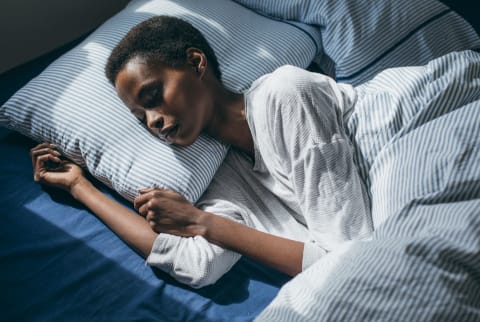
September 21, 2021 — 9:02 AM
Stepping outside after a long day indoors sure feels great at the moment, but will it have any long-term benefits? That’s what an international team of researchers set out to investigate with a new paper in the Journal of Affective Disorders. And if their results are any indication, sunshine time can be seriously advantageous for our health—most notably, for our sleep.
Besides offering a quick mood boost, spending time outdoors (even on cloudy days) exposes us to plenty of natural light. We know that this light can help keep our circadian clocks ticking smoothly, and that understanding served as a jumping-off point for this study.
“Humans evolved in an environment with a clear distinction between day and night, but our modern environments have blurred this distinction,” the paper reads. When we’re bombarded with artificial lighting and bright screens, we lose touch with the natural rhythms of the sun and moon, and it can be difficult for our bodies to keep track of what time it is. A slew of health challenges can follow suit: As we know from previous research on shift workers, a misaligned circadian rhythm can lead to all sorts of difficulties, including trouble sleeping.
To study the importance of daytime light exposure for sleep and overall health, this study looked to the UK Biobank, a database of the genetic and health information of over half a million people in the U.K.
The importance of outdoor time.
After crunching the numbers, the team found that the average Biobank participant spent a median of 2.5 hours of time outdoors daily. The kicker was that for every extra hour spent outside, participants reported better sleep. They tended to have an easier time waking up, more alertness throughout the day, and fewer issues falling asleep and staying asleep.
This shows just how much the light and sleep-wake cycles are connected. “Sleep and light are intricately linked. You can change your light cycle by changing your sleep cycle, and vice versa,” Steven Lockley, Ph.D., a neuroscientist at Brigham & Women’s Hospital and associate professor of medicine at Harvard Medical School, recently told mbg. For example, basking in light during the day tells the brain that it needs to be awake and alert. But once we close our eyes for bed, we shut off light from the brain, sending the signal that it’s time for sleep.
sleep support+
The deep and restorative sleep you’ve always dreamt about*

This new research provides a clue on how we can hack the cycles of light and darkness to get better sleep. In addition to avoiding bright light and technology at night, we need to get outside as much as we can during daylight hours.
Previous research, also out of the U.K., has suggested that 120 minutes a week is the minimum amount of time we should spend outside to support our health. This new study shows that, if good sleep is a goal, most of it should be during the day—when we can harness all the circadian-supporting, vitamin D-boosting benefits the sunshine has to offer (safely and covered in sunscreen, of course!).
Once you get the swing of using daylight to your advantage, you can continue to strengthen sleep by going to bed and waking up at similar times each day, leaving plenty of time to wind down at night, and trying a sleep-supporting supplement.* Here are 18 that have science to back them up.
Consider this new research your reminder to prioritize daily contact with the outdoors, especially now that daylight is starting to dwindle in the Northern Hemisphere. Even if you don’t have time for a full-on forest-bathing excursion or earthing retreat, taking a quick walk outside in your neighborhood can also help prompt all the bright benefits of the sunshine.

sleep support+
The deep and restorative sleep you’ve always dreamt about*
sleep support+
The deep and restorative sleep you’ve always dreamt about*








